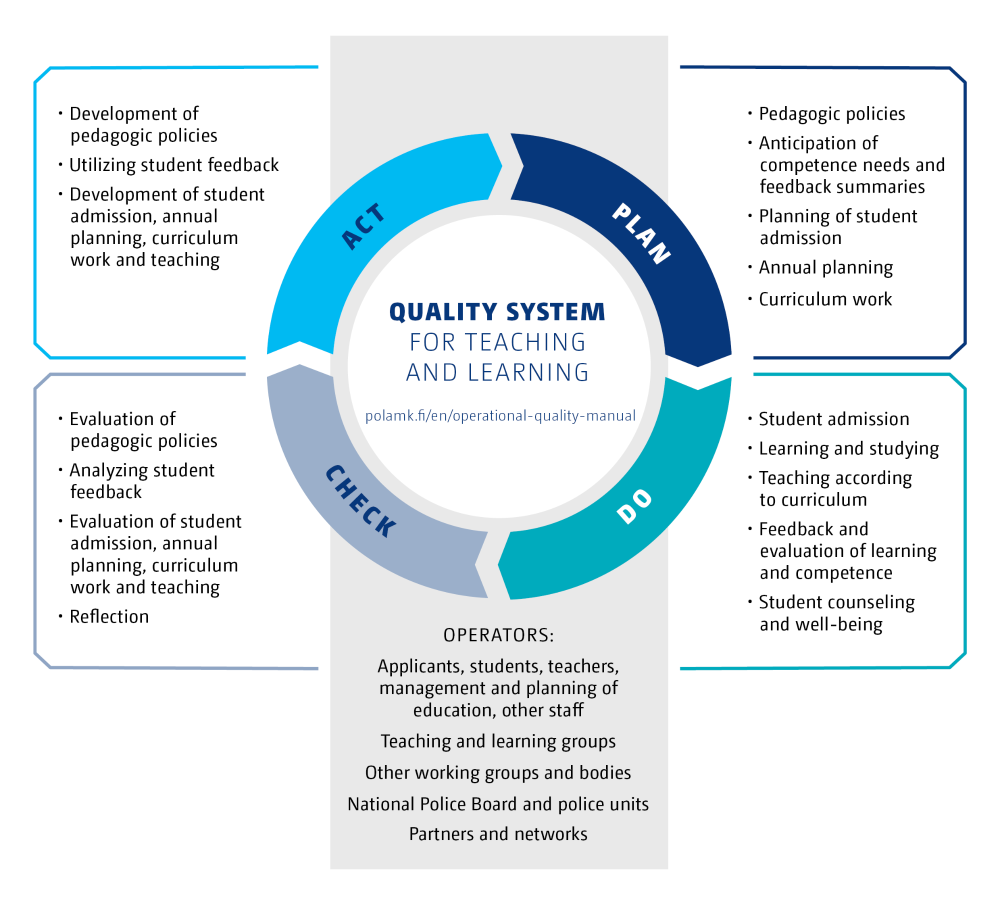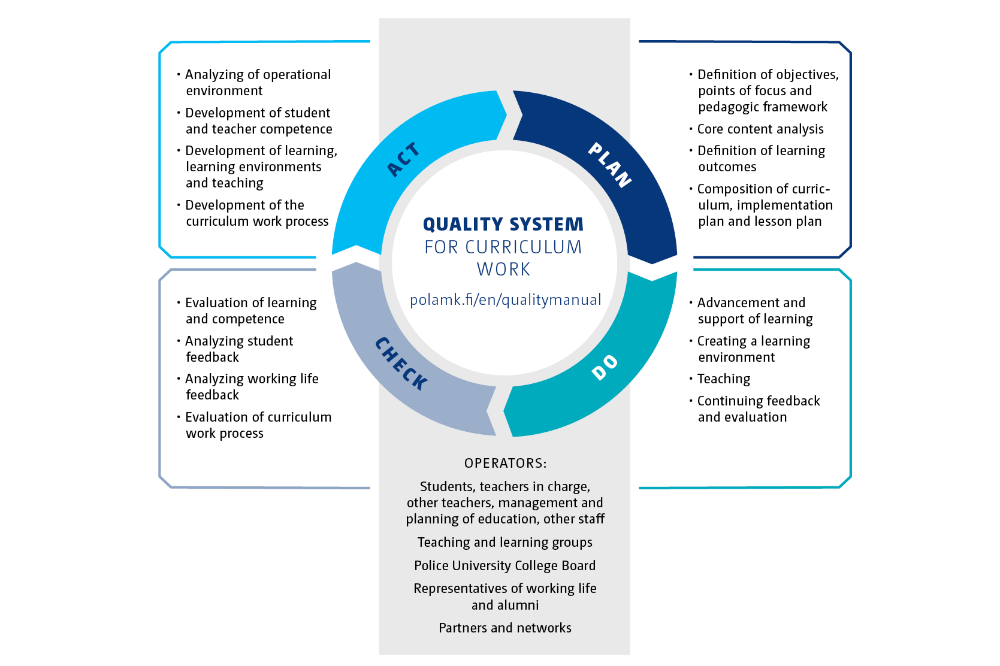Breadcrumb
Navigation Menu
Toimintakäsikirja opetuksen suunnittelu sisältö englanti
Planning of teaching and learning
The planning of teaching and learning are guided in particular by the Police strategy and Police University College strategic, pedagogical and RDI policies, as well as by the Police University College’s joint objectives. The identification of education needs, such as entirely new degree or continuing education programmes, is done as part of the strategic planning process described above. We anticipate competence needs in the processes for strategic planning, curriculum work and planning of selection criteria.

Our curricula are competence-based. When planning our education, we strive for constructive alignment and implement this on the basis of the principles of blended teaching. Constructive alignment means that the learning outcomes, contents, teaching methods and assessment are in line with each other and they support one another. Blended teaching comprises contact studies, online studies and authentic exercises at the educational institution and practical training usually at a police unit.
Toimintakäsikirja opetuksen suunnittelu sisältö haitari englanti
The key documents related to the planning of studies include the curriculum, the implementation plan and the lesson plan. In the curriculum, we describe the general and professional competences and learning outcomes of the degree. The implementation plan contains more detailed information on the implementation method, evaluation criteria and the student's workload. Lesson plans contain, for example, the detailed content of the course and facility needs. Work on curricula is supported by a curriculum guide, which brings together the principles, procedures and instructions of our curriculum work.

The objective of the curriculum process is to ensure consistent practices in the development and updating of curricula for degree programmes and specialization studies, as well as to increase awareness of the curriculum development process. The steps in curriculum work are the same, but the timing varies depending on the degree and specialization module.
Steps in Curriculum Work
- The Director of Education and Research initiates the preparation of curriculum work and defines the planning guidelines. Inputs include, among others, student feedback, feedback from working life, proposals and requirements from the National Police Board and various reports to be considered in curriculum work, performance agreements, etc.
- The Head of Education arranges a meeting for group supervisors and the coordinator of Swedish-language education and presents the curriculum guidelines decided by the Education and Research Steering Group.
- Group supervisors instruct the head teachers for the degree’s study modules, who plan and prepare the curriculum proposal together with other teachers.
- The Head of Education and Educational Developers support the preparation work during the process.
- The Head of Education arranges a meeting for group supervisors where they present the curriculum proposals and justifications for their respective areas of responsibility.
- The Head of Education and Educational Developer compile the proposals, review and comment on them as needed, and finalize the curriculum proposal.
- The Head of Education presents the curriculum proposal to the Education and Research Steering Group. The curriculum may, if necessary, be returned to the Head of Education for revision.
- The Director of Education and Research presents the curriculum to the Board of the Police University College.
- The curriculum approved by the Board of the Police University College is published.
- The Director of Education and Research approves the implementation plan details.
- The curriculum process is evaluated.
Curriculum work includes updating and developing curricula and implementation plans. Planning of lesson delivery and timetables is an important part of curriculum work.
Curriculum and teaching planning is a continuous development process, often described as a cycle where planning, implementation, evaluation, and development are ongoing. The planning and development of curricula and teaching follow the PDCA cycle (Plan, Do, Check, Act).
The key documents in the planning of teaching in the Bachelor of Rescue Services degree are the curriculum and the implementation plans for the courses. The curriculum describes the basic structure of the degree, defining i.e. the general objectives and starting points of the degree, the goals of each course, the core contents, the literature required in the studies and the principles for evaluation. The curriculum is prepared by the Emergency Services Academy Finland and confirmed by the Police University College. The implementation plan is the plan prepared for the implementation of a course described in the curriculum. Teacher in Charge for each course is responsible for the implementation plans of courses.
The Head of Education of the Leadership and Risk Management Training Unit is responsible for the preparation of the curriculum for the Bachelor of Rescue Services degree, together with the teachers in charge for courses included in the degree. The Director of Education presents the curriculum to the Police University College. The Police University College’s working group on curriculum development handles the draft curriculum. The Director of Education of the Police University College presents the curriculum to the Board of the Police University College that approves the curriculum as it is presented, or in an amended format, or returns it to further preparation.
The curriculum is prepared annually in accordance with the annual planning cycle for teaching at the Emergency Services Academy Finland.
The Head of Education compiles a preliminary annual plan for continuing education on the basis of the training preferences or training plans of the National Police Board, the National Bureau of Investigation (NBI), the Police, Customs and the Border Guard (PCB) training group and key stakeholders. This will include a training plan for Police dog operations, which we will prepare with the National Police Board’s expert group.
Our annual plan also includes training organised with partners, such as courses of the European Union Agency for Law Enforcement Training CEPOL organised and coordinated by the Police University College.

The heads of competence areas, lesson planning and accommodation are given an initial annual plan so that we can start resource planning. The annual plan will not be confirmed, but will be phased into implementation within the available resources.
Each continuing education programme has a Head of Course, who prepares the curricula together with various experts. The heads of the competence areas appoint the Head of Course or if the person heading the course does not work at the Police University College, they appoint a person responsible for the course at the university college. The task of the responsible person is to support the external head of the course in the planning and implementation of the studies. The Head of Course asks the head of the competence area to approve their course plan and reserves the needed facilities and accommodation.
We prepare curricula for all of our continuing education programmes on a uniform basis. We review and approve curricula at least once every two years. The head of course or the person responsible for the studies will submit a draft curriculum to an education developer, who will ensure its uniform structure and content. The Head of Education approves the curricula.
If necessary, we will make use of national expert networks in the planning of continuing education and in ensuring the quality of its implementation. The National Police Board assesses some of the education materials before they are published.
Toimintakäsikirja opetuksen suunnittelu infolaatikko oikea palsta englanti
See also
Curriculum guidelines: manual for competence-based curriculum work
More details on the teaching and learning process
Continuing education for police
More information for Polamk's personnel and students in Finnish
Curriculum work (Police intranet / Työtilat / Polamk OPSit ja totsut)
Continuing education (Police intranet / Henkilöstöasiat / Osaaminen ja koulutus / Täydennyskoulutus)
International education (Police intranet / Henkilöstöasiat / Osaaminen ja koulutus / Kansainväliset koulutukset)
